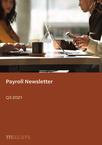
Payroll Newsletter Q3 2021
Amount of mileage allowance
Expenses proper to business travels can be reimbursed on a lump sum basis under certain conditions. If the employee (or the director) does not receive a company car and uses his own vehicle for business travels, the employer may grant the employee a lump sum allowance to cover his expenses proper to the use of his own vehicle for professional purposes.
The reimbursement of these business expenses can be done in two ways:
- Either via a reimbursement upon expense notes based on the actual expenses incurred;
- Either via a reimbursement of a fixed mileage allowance (0,3707 EUR per kilometre) (amount until June 30, 2022).
Conversion of eco vouchers of 2022 before October 31, 2021
The collective labour agreement concerning eco vouchers for employees falling under Joint Labour Committee 200, has been concluded for an indefinite period. Consequently, as an employer, in order to be compliant with Belgian law, in principle, you will have to grant eco vouchers to your employees again in (June) 2022.
However, it is also possible to reward your employees by granting another equivalent benefit instead of eco vouchers. Another equivalent benefit can be e.g. the implementation of meal vouchers or increasing the nominal value of the current meal vouchers, implementation of a collective medical expense / hospitalization insurance, …
The implementation process depends on the presence or absence of a trade union delegation within your company. Employers who want to convert their eco vouchers of 2022 into another equivalent have time until October 31, 2021.
In case you would like our advice or assistance relating to this conversion, please contact us.
Extension temporary unemployment due to force majeure
The flexible scheme of temporary unemployment due to force majeure will be extended until 30 September 2021, following a decision of the Belgian Minister of Employment.
Since 13 March 2020, the Corona temporary unemployment procedure has been reduced to an absolute minimum. Affected employees are covered by an adapted, exceptionally flexible unemployment statute. The entire system will be extended once again in its entirety and for all sectors currently until 30 September 2021.
Gradual phasing out of the obligatory tele-working measure due to the COVID-19 crisis
The tele-working measure, instated by the Belgian government due to the COVID-19 crisis, will be phased out in the course of the following months.
As of 9th June 2021, the employees are allowed to return to the office for 1 day per week, keeping into account that only 20% of the total active employee base are allowed to be present at the same time. For small businesses with a maximum of 10 employees, 5 employees are allowed to be present at the same time.
This return to the office cannot be forced by the employer as tele-working is still obligatory at this point in time.
Starting from 1st July 2021, tele-working is advised, however, it is no longer obligatory.
In all situations the hygiene, masks and social distancing measures have to be respected.
Bereavement leave – extension
A legislative proposal has been drafted which extends the bereavement leave from 3 to 10days, in case of the decease of a live-in partner or child.
3 of the 10 days are to be taken between the date of decease and the date of the funeral.
The remaining 7 days are free to be taken within a year after the decease.
Wage Agreement for the private sector
After months of negotiations, the Belgian federal government concluded a wage agreement for the next two years.
For the next two years the wage margin is set at 0,4%, which implies that wages can increase by a maximum of 0,4% on top of the yearly indexation.
Furthermore, the government has now confirmed that on top of this increase, the employer could decide to grant the employees a net premium. This premium can amount to a maximum of 500 EUR and is reserved for companies that delivered good economic results during the COVID-19 period.
Sickness during vacation period
If an employee becomes ill before his scheduled vacation starts, he will still be able to take these vacation days after his inability to work. The vacation days are therefore not lost and the employer will also have to pay the guaranteed wages for these days.
However, if the employee becomes ill during the vacation days, the employee will lose his scheduled vacation days. The employee cannot reschedule the vacation days to sickness days. If the period of incapacity lasts longer than the vacation period, the employer will have to pay the guaranteed salary for the remaining days of the 30 calendar days.
Single permit – Application via a new online platform
As of May 31, 2021, the single permit (i.e. a work permit that gives the right to work and reside in Belgium) has to be applied via the new online platform “Working in Belgium”.
The application will be transferred to the competent Belgian region (i.e. Flemish, Walloon, Brussels or German region) where it will be processed. The online platform can also be used to check the status of the filed application.
At this point in time, only single permits of limited duration can be applied via the platform. The competent governments of the regions assume that the platform will also be available for single permits of unlimited duration and work permits B in the beginning of 2022. Consequently, these applications should still be filed via e-mail.
As for now, single permits with limited duration can still be applied via e-mail until July 1, 2021 in case of technological issues with the platform.
Change in the settlement of the leave and early holiday pay
When an employee’s employment is terminated, he/she will be entitled to departure holiday pay from his previous employer. The amounts paid are stated on the holiday certificate.
The departure holiday pay consists of two parts:
- The single holiday pay for the holiday days of the current year that have not yet been taken; also the double holiday pay of the current year if the double holiday pay has not yet been paid.
- The single and double holiday pay for holidays accrued in the current year, which serves as the holiday service year for the following holiday year.
The paid leave and early holiday pay will be settled by the new employer.
From now on, the rules for the settlement of single holiday pay will change.
The settlement of the single holiday pay will from now on be spread on the basis of the holiday days taken.
It is important to inform newly hired employees of this so that they take into account that they will receive slightly less wages in the months that they take leave.
If you would like more specific information accordingly, please contact our payroll team.

